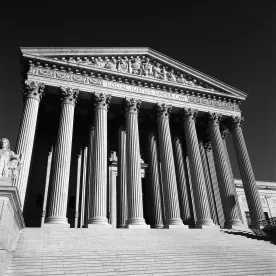In a 5-4 decision, issued during the final week of the its term, the U.S. Supreme Court held that the filing of a class action does not toll the three-year period provided for in Section 13 of the Securities Act of 1933. Interestingly, aside from the holding, both the majority and dissenting opinions contain statements potentially impacting institutional investors. The majority, in a phrase that could be repeated in the future by law firms soliciting institutional investors to opt out, asserted – citing only to law review articles from 2008 and 1997 – that plaintiffs who opt out have “considerable leverage” and receive “outsized recoveries.” Meanwhile, the dissent suggested that the majority’s decision will require “every fiduciary who must safeguard investor assets” to file individual actions before the three-year deadline.
The issue in the case was whether the filing of a class action tolls the three-year deadline for class members to file a claim under the Securities Act. Section 13 governs the time limit for instituting actions under Section 11 of the Securities Act. Its second sentence provides that “[i]n no event shall any such action be brought to enforce a liability created by [Section 11] more than three years after the security was bona fide offered to the public.”
The majority opinion, written by Justice Kennedy, and joined by Chief Justice Roberts and Justices Thomas, Alito and Gorsuch, ruled that “[f]rom the structure of §13, and the language of its second sentence, it is evident that the 3-year bar is a statute of repose.” According to the majority, by wording Section 13 as a statute of repose, Congress intended to “override customary tolling rules arising from the equitable power of courts.” Simply put, the majority concluded that if Congress wished for tolling to apply to the three-year period, it would have said so in the statute. Instead, “the text, purpose, structure and history of the statute all disclose the congressional purpose to offer defendants full and final security after three years.” Thus, the majority held that courts could not override congressional intent by applying the court-created American Pipe tolling rule to Section 13.
Notably, the plaintiff’s had argued, among other things, that the filing of a class action fulfills the purpose of the statute of repose because it put the defendants on notice of the claims against it. The majority rejected this argument, reasoning that the plaintiff’s position would allow for an unrestricted potential for individual suits, which meant that a defendant could not calculate its potential liability with much precision. This was especially so because, at least according to the majority (and the law review articles from 2008 and 1997 to which the majority cites), plaintiffs who opt out have considerable leverage and, as a result, may obtain outsized recoveries.
Also of note, the court rejected the plaintiff’s related argument that the filing of a class action complaint “brought” its “action” within the three-year time period, even though the plaintiff was merely a putative class member and had not intervened as a plaintiff in the suit. The majority dismissed this argument, stating that “it defies ordinary understanding to suggest that its filing – in a separate forum, on a separate date, by a separate named party – was the same ‘action,’ ‘proceeding,’ or ‘suit.’”
The dissent, however, would have accepted this argument. According to the dissent, authored by Justice Ginsberg and joined by Justices Breyer, Sotomayor and Kagan, the filing of the class-action complaint notified the defendant of its potential liability and, by opting out and filing its own suit, the plaintiff “simply took control of the piece of the action that had always belonged to it.” The dissent notes that as a result of the majority’s ruling,
[a]ny class member with a material stake in a § 11 case, including every fiduciary who must safeguard investor assets, will have strong cause to file a protective claim, in a separate complaint or in a motion to intervene, before the three-year period expires.
Additionally, the dissent feared that class members may not be properly apprised of their constitutionally protected right to opt out before the repose deadline. Thus, Justice Ginsburg concluded:
Today’s decision impels courts and class counsel to take a more active role in protecting class member’s opt-out rights… As the repose period nears expiration, it should be incumbent on class counsel, guided by district courts, to notify class members about the consequences of failing to file a timely protective claim. At a minimum, when notice goes out to a class beyond §13’s limitations period, a district court will need to assess whether the notice should alert class members that opting out would end their chances for recovery.
(internal quotations and alterations omitted).




 />i
/>i

